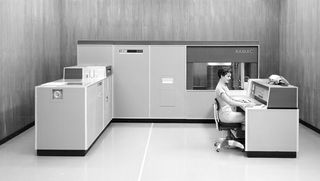codebytes4u
Forum Expert
- Joined
- Aug 5, 2016
- Posts
- 1,113
- Reaction
- 28,140
- Points
- 3,675

(Image credit: IBM)
So long, hard drives, and thanks for all the storage. The very last mechanical hard drive will be sold in 2028, bringing an end to the magnetic storage era.
At least, that's what Shawn Rosemarin of Pure Storage reckons, a company that—you guessed it—specializes in solid-state storage. And his reasoning is not quite what you might think.
"3% of the world’s power is in datacenters. Roughly a third of that is storage. Almost all of that is spinning disk. So if I can eliminate the spinning disk, and I can move to flash, and I can in essence reduce the power consumption by 80 or 90 percent while moving density by orders of magnitude in an environment where NAND pricing continues to fall, it’s all becoming evident that hard drives go away,” Rosemarin explained to Blocksandfiles.
If he's right, by 2028 it will bring to an end roughly 75 years of proud hard disk history. The very first commercially available computer running a hard drive with a magnetic disk was probably the IBM 305 RAMDAC of 1956(opens in new tab), a valve- rather than transistor-powered machine.
It sported no fewer than 50 24-inch magnetic platters for a total storage capacity equivalent to roughly 5MB in conventional binary storage. It also filled a decent sized room, as the image at the top of the page shows.
Just over 50 years later in 2007, the first 1TB HDDs were introduced. Today, the largest available HDD is Western Digital's 26TB drive, though that's a data center model. The largest drive you can slap into a PC is Western Digital's Red Pro 22TB SATA III, model, yours for a piffling $500(opens in new tab).
But here's the thing. The biggest SSD, the ExaDrive EDDCT100, clocks in at full 100TB. Of course, it also costs $40,000. So, the dollars-to-storage space ratio doesn't look too clever. But it does demonstrate that SSDs have already won the data density war. There's just, ahem, a little work to do on the cost efficiency side.
Anyway, whether or not the very last HDD is sold in 2028 or the technology survives a little longer, it's already very nearly toast in desktop PCs. While GPUs remain annoyingly pricey, SSD prices have tumbled dramatically in the last few years.
-PCGAMER